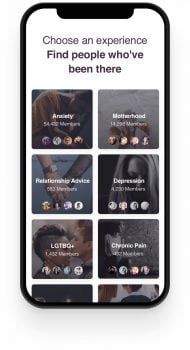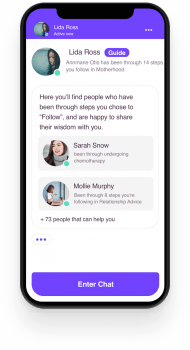Connecting with others has never been easier than in the present day. But this connectivity is a double-edged sword. While some forty percent of Americans feel lonely and isolated, according to the 2018 US Loneliness Index, increased social media use has been linked with heightened feelings of social isolation, especially in young people.
Wisdo, an Israeli mental wellness startup, wants to harness the power of online communities to lift people out of emotional pain by connecting with each other through shared experiences.
Launched in January 2018, Wisdo developed an app that connects people around shared issues such as questions of sexuality, anxiety, and loss and encourages those who have successfully traversed life challenges to become “helpers” or “guides.” The app already has 750,000 downloads and its active user base is at around 70 percent, according to Wisdo CEO Boaz Gaon.
The Tel Aviv-based startup, which has so far raised $11 million, recently won a 2019 Google Play Award in the “Best Social Impact” category.
Promoting meaningful relationships
Unlike most social networks that rely on the number of connections, Wisdo is entirely built around the quality of human interaction.
“Other online platforms celebrate how popular or provocative you are. But on Wisdo, we promote helpfulness,” Gaon tells NoCamels. The startup observes that genuine mutual support among users is key to positive online engagement. “It is our role as a community and as a company to constantly reward you for being helpful. Because the more you feel that you are helpful, the more helpful you will actually become to other people. There is a really strong healing process going on,” he explains.
Based on its users’ selection of “experiences” they have gone through, the app introduces them to other people who have experienced the same issues. “One thing that is very clear in our data, is that if the first experience people add to their profile is identical, the chances of having a meaningful conversation are dramatically higher,” Gaon tells NoCamels.
He compares this effect to passengers on a train ride, who accidentally find out they have something major in common. “Suddenly, you have a lot to talk about. And because of that, you feel safe to expose things that you wouldn’t share with someone who hasn’t been through the same.”
“When you’re facing a meaningful life event, something that changes your world, you don’t know what you don’t know. The knowledge that you need is not going to be found in books or on Google — it’s going to be found in the memories and experiences of people who’ve walked in your shoes,” Gaon told the Duke Chronicle this month.
Over 90 percent of the people who downloaded the app have been matched with others going through the same or similar experience, the company says.
Wisdo says its platform also analyses data to know which “experiences you haven’t even begun to think about, but might become part of your life.” For example, Gaon says, seeking wisdom around college is often linked to anxiety as a next experience.
Loneliness research with Duke
In March, Wisdo announced a collaboration with the Center for Advanced Hindsight at Duke University for the first large-scale study on the impact of emotional wellness networks on the growing societal issues of loneliness and isolation.
The study aims to “illuminate how a social network model based on providing users with authentic guidance impacts social isolation and support, compared to traditional social media platform,” Wisdo and Duke said in a statement.
The partnership stems from internal Wisdo research, analyzed by crowdsourcing expert Dr. Lior Tzoref, which surveyed over 7,600 members and revealed that the perceived social isolation of users dropped by over 15 percent over just a two week period.
Sign up for our free weekly newsletter
SubscribeDr. Julie O’Brien, principal and behavioral scientist at the Center for Advanced Hindsight at Duke said that core mission was “to make people happier, healthier, and wealthier through exploring the psychological processes behind behavior change.”
“We believe that behavioral science has the power to solve some of the world’s biggest problems, especially when paired with technology and bold ideas. We’re excited to be working with the Wisdo team on this important new research…” she added.
Marketplace for wisdom
One big question is how Wisdo stays ahead of moderating the concerns of so many people. A big differentiator of the platform is that its community is almost entirely self-managed. Wisdo works with a badge system, in which very active users can ascend to become “helpers” and “guides.”
“There is a hierarchy of moderators just like on Waze or Wikipedia – the more you help other people, the higher you rank on the platform. And you earn editing rights that enable you to maintain the safety of the platform and the quality of the conversation,” Gaon explains.
Not only are badge holders mentored for 30 days before taking on a new role, they also receive monthly crisis training sessions. “You never jump into a situation that you don’t know how to handle,” Gaon emphasizes.
This way, Wisdo ensures adequate responses to sensitive content or, for example, expressions of suicidal thoughts in conversations. “Our community guides receive automatic notifications when a person mentions a keyword that is on a watchlist like ‘knife’ or ‘death.’ Then, they go to the group and look at the context,” Gaon explains. Based on this, the individual decides whether the contribution will be removed or needs additional moderation.
Become a guide for life
Currently, the top three concerns on Wisdo are mental health (anxiety, loneliness, heartbreak, depression), relationships (falling in love, getting married/divorced, having a child) and self-improvement (enhancing happiness, sleep and motivation or reducing stress). “For the age group of 18 to 34, that we are mostly interacting with, these seem to be the most pressing issues,” Gaon tells NoCamels.
In the future, Gaon would like to branch Wisdo out to more diverse age groups. While the app currently caters mostly to the concerns of young adults, the co-founder aims to include older generations’ issues, such as retirement, aging, and physical illness.
“We really want to be the go-to for wisdom, the app that you open up whenever you are going through something in life. Just like you open up Waze when you want to drive,” he tells NoCamels. In aspiring to enhance continuous well-being, he says, the company’s ultimate goal is “to become to ‘wisdom’ what Facebook is to ‘social’ and Google is to ‘knowledge’.”
And indeed, the startup does “see signs that Wisdo can become a guide for life”, rather than a refuge for emergency advice.
On average, Gaon says, users add up to five experiences to their profile. “So what usually happens is that people join the app with one thing on their mind, and end up discovering additional experiences that they are interested in.” Interacting with people who have been through those challenges enables Wisdo users “to stay one step ahead of whatever life might throw at you,” the CEO explains.
A personal connection
Gaon says he drew his inspiration for Wisdo from experiencing the loss of his father, Israeli businessman and philanthropist Benny Gaon, who had suffered from pancreatic cancer before passing away in 2008.
Feeling a lack of practical knowledge and emotional support throughout his father’s illness inspired Boaz to create a platform for seeking and sharing such unique wisdom. Together with Ido Jonathan Engel, he founded Wisdo in 2015 with the wish “to remind people that they are not alone in the world.”
Related posts

Editors’ & Readers’ Choice: 10 Favorite NoCamels Articles

Forward Facing: What Does The Future Hold For Israeli High-Tech?

Impact Innovation: Israeli Startups That Could Shape Our Future







Facebook comments